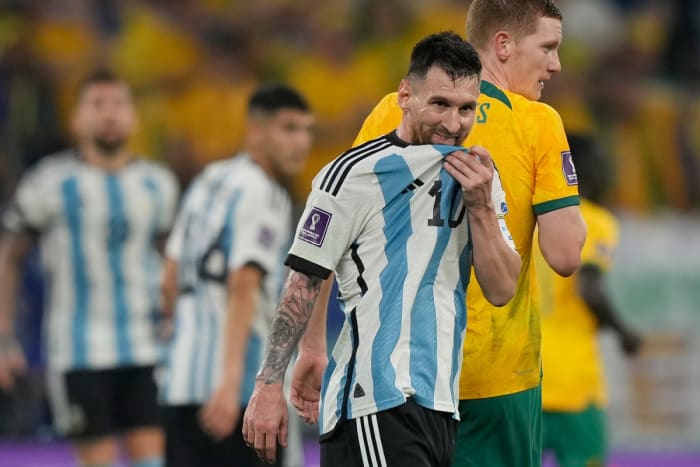Messi and His Milestones Sustain Argentina’s World Cup Title Dream
AL RAYYAN, Qatar — Papu Gomez’s ball back out to the corner taker wasn’t great, spinning awkwardly and given too much height so an Australian defender could get close. Fortunately for Argentina, the corner taker was Lionel Messi. He trapped it instantly, pushed the ball to Alexis Mac Allister then accelerated—as much as he ever does these days—into the box so that as Nicolas Otamendi touched Mac Allister’s pass into his path, he could arc the ball low into the far corner—his first ever goal in a World Cup knockout game.
In three seconds, Argentina had gone from seemingly losing possession to a goal that was almost impossible to stop. That is what Messi gives you. This wasn’t a brilliant goal. Highlights reels of his greatest moments will not include it. But it was devastating. Among all his gifts, perhaps his greatest is his minimalism, the way that, for all his extraordinary ability, he always chooses the lowest tariff action necessary to complete whatever he wants to do.
This was Messi’s 1000th professional appearance for club and country. It was his 16th appearance in a World Cup match, and probably his best, equalling the Argentinian record held by Diego Maradona. He will claim the record for himself in the quarterfinal against the Netherlands, the country against whom, in 2006, he made his first World Cup start. At 35, he is physically diminished, a sprite who flits into games only when he feels it necessary. Hit a high ball towards him and he will watch the defender head it clear without bothering to challenge. And yet he is the player who makes it possible for Argentina to think it might win a third World Cup. All everybody else has to do is keep things tight.
Argentina did start particularly well. It had little urgency, gave no sense of wanting to stifle Australia as it had stifled Poland (although Poland perhaps contributed to that). Messi had misplaced three passes. But then, a minute before the goal, Aziz Behich of Dundee United had been slightly late in a challenge on Messi, who had reacted angrily. It’s probably best not to rile him.
It’s also probably best not just to give Argentina goals. Twelve minutes into the second half, Mat Ryan threw the ball to Behich who went back to Kye Rowles who returned it to his keeper. Ryan could have belted it clear as Rodrigo De Paul closed in, but he tried to take the ball past him, only for Julián Álvarez to capitalize on his heavy touch and roll the ball into an empty net. One moment of Messi brilliance, one terrible Australian mistake, and that was enough.
Only just enough, though, as a Craig Goodwin shot deflected off Enzo Fernandez and beat Emi Martinez. Then came almost the most implausible of equalizers as Behich, a 31-year-old left-back, suddenly jinked through three challenges and was denied in his shooting stride only by a desperate, but perfectly timed challenge by Lisandro Martinez. And then, in the final seconds, the 18-year-old substitute Garang Kuol forced goalkeeper Emi Martinez into a sharp reflex save with a shot on the turn.
“It was a very challenging game,” said Argentina manager Lionel Scaloni, who had clearly been troubled that the match came barely 72 hours after the win over Poland. “They pressed us very intensively. They were fresher than us so the first half was tough. Messi scored the opening goal and then we improved considerably after halftime.”

Argentina’s win over Australia was not without some nervy moments in the last 15 minutes plus stoppage time.
Frank Augstein/AP
In the end, it was tense, but it hadn’t really been close. Messi had set up chance after chance for team-mates only for them to be missed. In that there were real echoes of Diego Maradona in 1986, particularly in the way he seemed so understanding of their fallibility, something that hasn’t always been the case. “We had played very recently,” he said, “and didn’t have much time to rest up. We were concerned as we knew it was going to be a very physical match and they were very strong. But that’s the World Cup—the matches are always difficult but what’s important is that you win.”
Once again Argentina’s fans dominated the stadium, one again the atmosphere they created an inspiration. Messi spoke of the “close bond” with the fans of how the players, tired as they were, were desperate to play in front of them again. There is a sense of everything pulling in the same direction but, at the same time, every win provokes a great emotional outpouring. After Mexico it was for the resurrection of the World Cup campaign following the Saudi Arabia defeat. After Poland it was for qualification. And after this for making the quarterfinal.
Perhaps that is what keeps driving Argentina forward, as though it trusts its will more than its ability, and yet it’s hard to avoid the thought that it must be draining. Is it sustainable? With Messi playing like this, with the power of narrative behind him, it might be.







